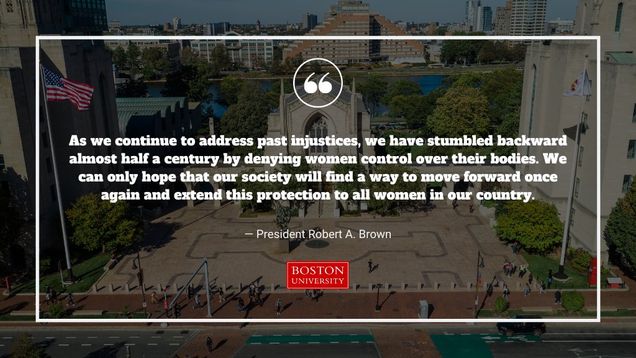News
How Copyrights, Patents, and Trademarks May Stifle Creativity and Progress
Intellectual property scholar Jessica Silbey argues laws haven’t kept pace with the digital era and are enriching individuals and corporations at the expense of society, equality, and innovation.
BU Today Close-Up
Provost Jean Morrison Weighs in on CHIPS and Science Act.
Why Is the Cuban Immigrant Story in the US So Different from Others
Cold War politics led to special policies and domestic political power.
CHIPS, Science Budgets, Biden Science Priorities
BU IN DC
Mayank Varia of the Faculty of Computing & Data Sciences attended a meetingof the Advisory Committee on Data for Evidence Building, of which he is a member, on July 22nd.
Joshua Goodman of the Wheelock College of Education & Human Development announced he will start a year-long position next week as a senior economist with the White House Council of Economic Advisers.
Eve Manz of the Wheelock College of Education & Human Development moderated a National Academies of Sciences, Engineering, and Medicine panel on integrating science and engineering in preschool and elementary school on July 28th.
CONGRESS SENDS MAJOR SCIENCE BILL TO THE PRESIDENT
Congress passed a massive science bill and sent it to the President this week, paving the way for his approval of legislation that increases the funding targets for the National Science Foundation (NSF) and U.S. Department of Energy (DOE) Office of Science. The science bill included in the CHIPS+ Act (H.R. 4346) directs the NSF and DOE to award more grants to institutions in states that historically have not successfully competed for significant federal research funding, requires grantees to alert federal science agencies when research personnel are found to have engaged in sex-based harassment, asks grantees to disclose more information on their collaborations with international partners, and creates new programs to broaden participation in the sciences by underrepresented populations. President Joe Biden is expected to quickly sign the bill into law.
SENATE PROPOSES RESEARCH, STUDENT AID INCREASES
On Thursday, Democrats on the Senate Appropriations Committee unveiled their proposed funding levels for government operations in fiscal year 2023. The bills released by the Committee would increase several science and student aid accounts, including a proposed 6% increase for the National Institutes of Health, 17% increase for the National Science Foundation, and 7% increase for the Pell Grant award for low-income students. Senate Republicans have not yet agreed to the funding levels, which would also need to be reconciled with the proposals put forward by the U.S. House of Representatives. A final spending agreement is not expected before the expiration of the current fiscal year on September 30th, necessitating a continuing resolution to keep the government operating this fall.
BUZZ BITS...
- Last week, the White House released a memorandum identifying the Biden Administration's scientific priorities for fiscal year 2024. The plan includes reducing the cancer death rate by half and cultivating an equitable STEM ecosystem, as well as previously-stated priorities such as preparing for and preventing pandemics and tackling climate change.
- The National Aeronautics and Space Administration (NASA) announced that Dr. Mark Clampin will become the next astrophysics division director within the agency's Science Mission Directorate (SMD) on August 15th. Dr. Clampin, who currently oversees science programs at Goddard Space Flight Center, will replace Dr. Paul Hertz, who will become a senior adviser to SMD after leading the astrophysics division for ten years.
- The U.S. Department of Energy (DOE) announced that Maria Duaime Robinson will serve as director of DOE's Grid Deployment Office. Ms. Robinson previously served as the first Korean American elected to the Massachusetts House of Representatives.
A Note To Our Readers: Beltway BUzz will not publish in August due to the Congressional District Work period. In the meantime, you can find updates on Twitter and our website. See you in September!
White House COVID Response, Urban Heat Islands, BU Astronaut
BU IN DC

BU's Nahid Bhadelia Joins White House COVID-19 Response Team
Bhadelia, an infectious diseases physician and global leader in pandemic preparedness, was named senior policy advisor for global COVID response.
FACULTY EXPERT

Amid Climate Change, BU Researchers Study Chelsea's "Heat Island"
BU environmental health scholars Madeleine Scammell and Patricia Fabian study ways to cool down one of the hottest spots in Massachusetts, where temperatures can reach 140 degrees.
Learn how to turn down the heat
ON THE CHARLES RIVER

Live From Space, BU Alum and Astronaut Bob Hines Talks Gravity, Lasagna, and NASA Careers
The university hosted a live downlink on campus that allowed Boston high school students to ask questions of the astronauts on the International Space Station.
THOUGHT LEADERS
In Case You Missed It...
President Joe Biden nominated Martha Guzman (LAW '92) to serve on the United States District Court for the District of Massachusetts; she would be the first Hispanic judge to serve on the Court... Joshua Goodman of the BU Wheelock College of Education & Human Development hopes schools rethink their COVID protocols this school year in The Boston Globe... Deborah Carr of the BU College of Arts & Sciences explains how women decide whether to change their last names when they marry in CNN... Hyeouk Chris Hahm of the BU School of Social Work discusses the pressures Asian American women face on NPR... Kevin Gallagher of the BU Global Development Policy Center says the world economy is in a "rudderless moment" in Reuters.
OSTP Nominee, Humanities Funding, Nutrition & Health
BU IN DC
Roscoe Giles of the College of Engineering participated in a meeting of the U.S. Department of Energy’s Advanced Scientific Computing Advisory Committee, of which he is a member, on July 21st and 22nd.
SENATE HEARS FROM OSTP NOMINEE
On Wednesday, the Senate Commerce, Science, & Transportation Committee held a hearing to consider the nomination of Dr. Arati Prabhakar as director of the White House Office of Science and Technology Policy (OSTP). In her testimony, Dr. Prabhakar acknowledged the need to develop a respectful workplace culture at OSTP in the wake of allegations of bullying under the previous director; she pledged to make it a top priority if confirmed. Senators questioned Dr. Prabhakar about climate change research, increasing National Science Foundation support for institutions in states that historically don't receive significant funds, cybersecurity, and broadening participation in science. Next, the Committee will vote on Prabhakar's nomination and send it to the full Senate for a confirmation vote.
BUZZ BITS...
- On Wednesday, the U.S. House of Representatives passed legislation to increase funding for research programs at the U.S. Department of Energy and the National Endowment for the Humanities by 7% and 14%, respectively, in fiscal year 2023. Lawmakers rejected an amendment to reduce funding for the National Endowments for the Arts and the Humanities by more than $100 million. The U.S. Senate has not yet unveiled its version of the spending bills, which will need to be reconciled with the House version before a final package can be sent to the White House.
- The House passed the annual defense policy bill (H.R. 7900) last week. The measure includes a provision to create a limited visa program for immigrant scientists who are engaged in research related to national security. The Senate is expected to take up its version of the National Defense Authorization Act this fall.
- The White House is hosting a virtual Roundtable on Ensuring Safety and Opportunity in STEM Environments: Preventing and Addressing Identity-based Harassment today at 1 p.m. Eastern. Participants will reflect on the 50th anniversary of Title IX and discuss both advancements in and barriers to women's participation in science.
AGENCY NEWS YOU CAN USE
The National Institutes of Health (NIH) Office of Nutrition Research (ONR) released a request for information (RFI) on the impact of diet, food environment, and related exposures on the developmental origins of health and diseases (DOHaD). NIH is seeking responses to inform the agency’s future research on the effects of parental health and nutritional status and eating behaviors during pregnancy and in early developmental stages on their children’s growth, eating patterns, and vulnerability to diet-related diseases. The RFI specifically solicits input on topics including research gaps on DOHaD, women’s health, or child development; relevant social determinants for vulnerable or underrepresented populations; practices to address barriers and gaps in this research; potential pre- or periconceptual interventions; and projected challenges in data collection. Responses are due by August 15th.
Live from Space, BU Alum and Astronaut Bob Hines Talks Gravity, Lasagna, NASA Careers
University event lets high school students and others ask questions of astronauts on the International Space Station.
Spending Bills, NSF Social Science, Global Health Research
BU IN DC
Nahid Bhadelia of the Center for Emerging Infectious Diseases Policy & Research joined the White House's COVID-19 Response team as a senior policy advisor for global disease response.
Micaelah Morrill of Innovate@BU and Megan Sandel of the School of Medicine participated in a White House Hunger Summit Listening Session hosted by Congresswoman Ayanna Presley (D-MA) and Project Bread in East Boston on July 11th.
President Joe Biden nominated Martha Guzman (LAW '92) to serve on the United States District Court for the District of Massachusetts on July 13th.
HOUSE SPENDING PANEL APPROVES SCIENCE, STUDENT AID INCREASES
The House Appropriations Committee recently passed several spending bills which propose significant increases to federal research agencies and student aid for fiscal year 2023. The Committee proposed:
- National Institutes of Health: $47.5 billion, a 5.6% increase
- National Science Foundation: $9.6 billion, a 9% increase
- Department of Energy Office of Science: $8 billion, a 7% increase
- NASA Science: $7.9 billion, a 4% increase
- Department of Defense Basic Research: $2.6 billion, a 6% decrease
- Pell Grant maximum award: $7,395, a 7.3% increase
- National Endowment for the Humanities: $207 million, a 15% increase
- Advanced Research Projects Agency-Health: $2.75 billion, a 175% increase
The U.S. Senate has not begun consideration of its version of the spending bills. Lawmakers are not expected to reach agreement on the final bills prior to the October 1st start of the federal fiscal year and are likely to enact a continuing resolution to keep the government operating at current funding levels.
BUZZ BITS...
- The National Science Foundation (NSF) announced that Dr. Kellina Craig-Henderson will serve as the next assistant director of the NSF Social, Behavioral and Economic Sciences (SBE) Directorate. Dr. Craig-Henderson has served as SBE's interim director since January and has been with NSF for over 16 years. She previously served on the faculty at the University of Illinois Urbana-Champaign.
- The National Oceanic and Atmospheric Administration (NOAA) appointed Dr. Sarah Kapnick as NOAA's next chief scientist. Dr. Kapnick previously served as senior climate scientist and sustainability strategist at J.P. Morgan after spending ten years at NOAA’s Geophysical Fluid Dynamics Laboratory.
- On June 8th, the U.S. Department of Education announced that Dr. Jordan Matsudaira will serve as ED's first chief economist. Dr. Matsudaira will conduct research to guide the Department's policymaking and serve as a liaison to the education policy research community. He will also continue as ED's deputy undersecretary for higher education. Matsudaira was previously an economist with Teachers College at Columbia University.
AGENCY NEWS YOU CAN USE
The National Institutes of Health (NIH) has issued a request for information (RFI) seeking public input on how the agency can better promote equity in global health research. NIH is particularly interested in submissions that address the elements of successful collaborations with researchers in low and middle-income countries. Responses will be used to inform NIH's practices and procedures for supporting global health research and are due by August 1st.
BU’s Nahid Bhadelia Joins White House COVID-19 Response Team
Bhadelia, an infectious diseases physician and global leader in pandemic preparedness, named senior policy advisor for global COVID response.
Reproductive Rights, Refugees, Data Gaps
ON THE CHARLES RIVER

University Affirms Commitment to Guaranteeing Women’s Reproductive Rights
In a letter following the Supreme Court's decision to overturn Roe v. Wade, President Brown assured the BU community that the University remains steadfastly committed to guaranteeing women’s reproductive rights under Massachusetts law.
FACULTY EXPERT

America the Miserly: How Our Refugee System Fails Desperate People
With thousands fleeing Ukraine and millions still displaced by the Syrian civil war, BU sociologist Heba Gowayed's new book faults the United States, Canada, and Germany for letting down refugees.
Understand the refugee experience
RESEARCH HIGHLIGHT

Data Gaps for Race and Ethnicity Are Holding Back Antiracism Efforts, New Report Says
Ibram X. Kendi–led BU Center for Antiracist Research calls for new federal data standards to help confront racial inequities and injustice.
THOUGHT LEADERS
In Case You Missed It...
Dean Angela Onwuachi-Willig of the BU School of Law tells WGBH that Justice Ketanji Brown Jackson could have a huge impact on a divided Supreme Court... Catherine Klapperich of the BU College of Engineering describes how the Dobbs decision will change her research on reproductive health technology in STAT... Julia Raifman of the BU School of Public Health calls the Supreme Court's recent abortion decision structural violence in Vox... Alumna Shwetika Baijal (CGS’07, UNI’09) is organizing a national response to the Supreme Court's Dobbs decision for the Planned Parenthood Action Fund... the BU Global Development Policy Center posted job openings for a policy liaison and a project coordinator.